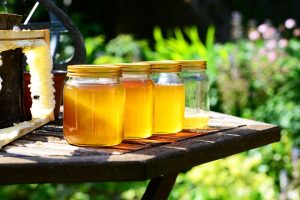 The composition of honey is a unique vitamin-mineral complex, which is similar in formula to the mineral composition of human blood. It is this similarity that contributes to the rapid absorption of honey in the body in the human body.
The composition of honey is a unique vitamin-mineral complex, which is similar in formula to the mineral composition of human blood. It is this similarity that contributes to the rapid absorption of honey in the body in the human body.
In addition, the composition of honey includes 60 substances, namely:
• carbohydrates (glucose and fructose);
• nitrogenous substances, which are compounds of protein and non-protein origin;
• iodine, iron, sulfur, phosphorus, magnesium, calcium, chlorine salts, sodium salts;
• copper, lead, chromium, boron, aluminum, lithium, tin, manganese;
• organic acids (lactic, malic, tartaric, gluconic, citric);
• inorganic acids (hydrochloric and phosphoric);
• vitamins (A, a group of vitamins B, C, E, H, K);
Due to the unique composition, honey has antibacterial, bactericidal and anti-inflammatory properties. Besides:
• improves blood composition and metabolism (subject to daily consumption of 30-50 grams throughout the year);
• strengthens the walls of blood vessels, as well as the heart muscle;
• relieves arthritis pain;
• used in various types of intestinal disorders;
• recommended for colds;
• helps fight anemia;
• due to the content of various enzymes, contributes to the normal digestion of food;
• contributes to the rapid healing of wounds, because it has antiseptic, antibacterial and antifungal properties;
• having the opposite structure with fat, contributes to its splitting, so it is often prescribed in diets, despite the high calorie content;
• used as a depressant (1 teaspoon of honey, diluted with warm water, tea or milk is recommended even for children and pregnant women);
• used as a tonic and tonic;
• has preventive properties against many diseases;
Other bee-keeping products – propolis, royal jelly, bee venom have indisputable useful qualities. However, honey, with all its useful qualities, like a medal, has two sides.
There is a small percentage of people who have an intolerance to this product, and, therefore, there are also contraindications for its use:
• allergy to honey and bee products (sometimes a certain type of honey can cause allergies);
• diabetes;
• causes caries faster than sweets and sugar, so it should be used in moderation and after use it is necessary to rinse the mouth thoroughly;
• It is not recommended to eat on an empty stomach in the event that food is not supposed to be eaten in the next 30 minutes;
• It is not recommended to give children up to a year;
• honey can not be consumed with hot milk or tea, because, besides the fact that during heat treatment it loses its beneficial properties, it also releases carcinogens harmful to the body.
Picture Credit: PollyDot
